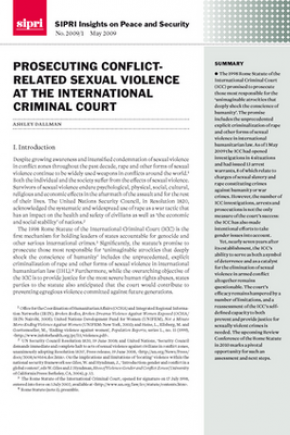Prosecuting Conflict-related Sexual Violence at the International Criminal Court
The 1998 Rome Statute of the International Criminal Court (ICC) promised to prosecute those most responsible for the ‘unimaginable atrocities that deeply shock the conscience of humanity’. The promise includes the unprecedented explicit criminalization of rape and other forms of sexual violence in international humanitarian law. As of 1 May 2009 the ICC had opened investigations in 4 situations and had issued 13 arrest warrants, 8 of which relate to charges of sexual slavery and rape constituting crimes against humanity or war crimes. However, the number of ICC investigations, arrests and prosecutions is not the only measure of the court’s success: the ICC has also made intentional efforts to take gender issues into account.
Yet, nearly seven years after its establishment, the ICC’s ability to serve as both a symbol of deterrence and as a catalyst for the elimination of sexual violence in armed conflict altogether remains questionable. The court’s efficacy remains hampered by a number of limitations, and a reassessment of the ICC’s self-defined capacity to both prevent and provide justice for sexually violent crimes is needed. The upcoming Review Conference of the Rome Statute in 2010 marks a pivotal opportunity for such an assessment and next steps.
I. Introduction
II. Background
III. The efficacy of the International Criminal Court: Actual or symbolic justice?
IV. Looking forward
V. Conclusions

